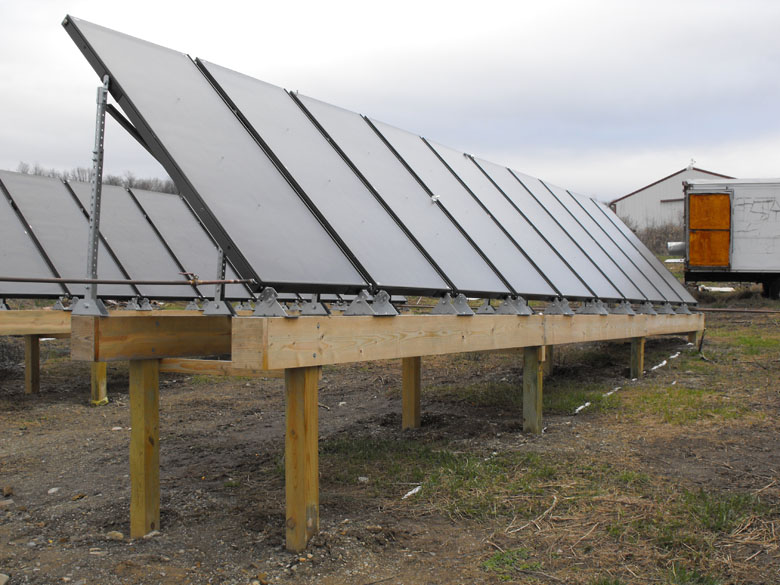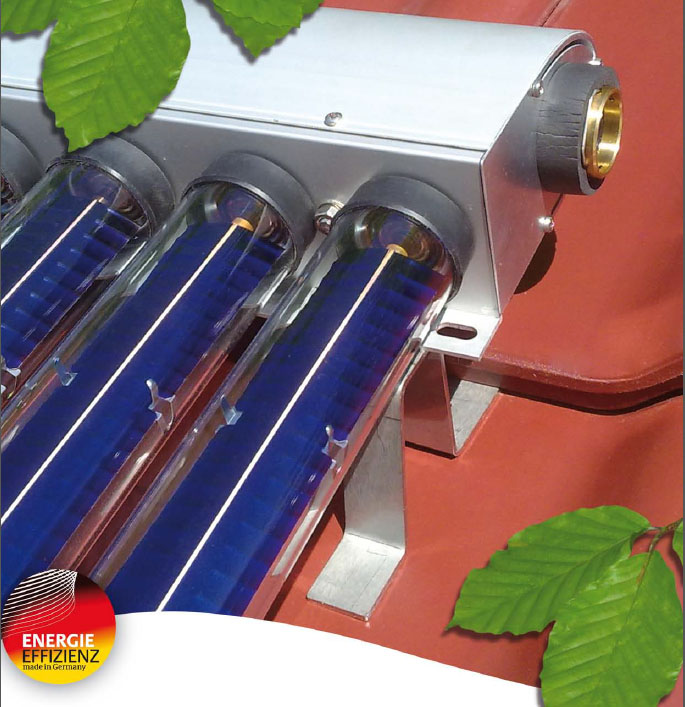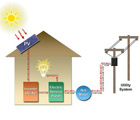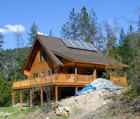

What is Solar Hot Water Heating?
A system of thermal collectors that use a liquid working fluid to collect heat energy from the sun. With the exception of swimming pool heaters, the products that we offer use a food grade Glycol anti-freeze working fluid. The top picture is two Enerworks flat plate collectors mounted on a roof.
Quoting from an NRCan brochure, "You can use the sun’s energy to heat water. In Canada, solar domestic hot water (SDHW) systems are usually selected and sized to provide approximately 60 percent of the hot water requirements for an average home, depending on the local climate and hot water use. Solar water heater systems include collectors, a circulating pump, a storage tank or tanks, and controls. They are commonly configured to preheat water with a conventional water heater for backup. Solar preheat units typically have two tanks. One tank stores solar heat and one is connected to a conventional storage
water heater that can be heated by any source (electric, gas or oil). A tankless (on-demand) water heater can also be used instead of the second tank".
The percentage of the household's hot water needs used in the sizing calculations depends on a number of factors, which include:
- Inlet water temperature. River or lake sourced water is much colder in the winter than water from wells. The colder the water, the more energy required to heat it to the desired storage temperature.
- The number of residents and their average hot water use.
- The location of the residence, and the solar radiation potential of that location.
- The shading and mounting location of the thermal collectors.
An efficient thermal collector can convert about 70% of the sun's energy falling on it into heat. A PV solar panel converts about 16% to a maximum of 22% of the sun's energy falling on it into electricity. This efficiency is continuing to improve. This suggests that if you require energy for heating, it is far more efficient use of surface area to collect it with thermal collectors. Using PV panels to generate electricity and then use that electricity to heat water with resistance heaters requires far more surface area for the same amount of heat captured from the sun. However this approach is also practical in Canada, since PV collectors are made in vastly greater numbers, and are much lower in cost. Currently the only disadvantage is the PV collectors require more surface area.
Solar hot water heating systems for residential applications are not sized to meet 100% of a household's requirements. Instead they are always installed as a supplemental source of hot water complimentary with either an electric or fossil fuel energy source.
Some applications for solar hot water are:
- DHW supplemental heating (Domestic Hot Water)
- Supplemental Heat for a radiant floor or ceiling heating system
- Pool heaters
- Commercial uses or large quantities of hot water, such as:
- Dairy farms
- Restaurants
- Car wash
- Healthcare
- Government
- Manufacturing
- Educational Facilities
- Hospitality
- Multi-Family buildings
Our Products
- Complete systems Enerworks Flat Plate collectors and Energy Station for a complete package for residential or commercial applications
- NARVA S-power Vacuum Tube Collectors made in Germany and Enerworks Energy Station or commercial appliance for a complete system.
- Enersol Solar Swimming Pool Heater. Click for details about sales and service for this product.
What services do we offer for Soalr DHW?
- We offer site surveys to determine the suitability for solar hot water, the impact of shading and determine the amount and temperature of water to be heated. We determine the best location for the collector panels, on the roof, on the side of a building, or free standing.
- We provide an detailed quote for a DIY kit including bill of materials and consulting services during installation.
- We can leak test and charge a new DIY system with glycol and commission it for you.
- We repair Enerworks solar hot water heaters as well as other brands. We stock parts to repair and service Enerworks products, but not for other brands.
Flat Plate Collectors

This example of the Enerworks Flat Plate collectors is installed on a free standing ground mounted wood frame rack. This is supplying hot water for a dairy farm. This is a very attractive mounting method where there are no south facing roofs.
The flat plate collectors shed snow easier, and are simpler keep clear of snow by manual snow clearing. These are made in Ontario.
Similar but not identical collectors are used in our package of residential DHW systems, and a system specification is available here.
Vacuum Tube Collectors

This is a close up of a portion of one collector. The photograph at the top of another page shows a number of these collectors installed on a roof. A data sheet is available here.
In general in warmer climates the Flat Plates are more efficient, however in our Canadian climate Evacuated Tubes work better, mainly because they are “a vacuum tube” and any heat they collect, remains inside due to the vacuum preventing conduction and convection losses. These collectors can harvest solar radiation of the back side of the collector, for additional heat capture. These are more efficient in collecting energy on cloudy or overcast weather. These can produce a higher temperature hot water than flat plate collectors.
More Questions About Solar Hot Water





